
February 14
1779 Death: Captain James Cook—the great English explorer and navigator—is murdered by natives of Hawaii during his third visit to the Pacific island group:
In 1768, Cook, a surveyor in the Royal Navy . . . led an expedition that took scientists to Tahiti to chart the course of the planet Venus. In 1771, he returned to England, having explored the coast of New Zealand and Australia and circumnavigated the globe. Beginning in 1772, he commanded a major mission to the South Pacific and during the next three years explored the Antarctic region, charted the New Hebrides, and discovered New Caledonia. In 1776, Cook sailed from England again as commander of the HMS Resolution and Discovery, and in January 1778 he made his first visit to the Hawaiian Islands. He may have been the first European to ever visit the island group, which he named the Sandwich Islands in honor of one of his patrons, John Montague, the Earl of Sandwich.
Cook and his crew were welcomed by the Hawaiians, who were fascinated by the Europeans' ships and their use of iron. Cook provisioned his ships by trading the metal, and his sailors traded iron nails for sex. The ships then made a brief stop at Ni'ihau and headed north to look for the western end of a northwest passage from the North Atlantic to the Pacific. Almost one year later, Cook's two ships returned to the Hawaiian Islands and found a safe harbor in Hawaii's Kealakekua Bay.
It is suspected that the Hawaiians attached religious significance to the first stay of the Europeans on their islands. In Cook's second visit, there was no question of this phenomenon. Kealakekua Bay was considered the sacred harbor of Lono, the fertility god of the Hawaiians, and at the time of Cook's arrival the locals were engaged in a festival dedicated to Lono. Cook and his compatriots were welcomed as gods and for the next month exploited the Hawaiians' good will. After one of the crewmen died, exposing the Europeans as mere mortals, relations became strained. On February 4, 1779, the British ships sailed from Kealakekua Bay, but rough seas damaged the foremast of the Resolution, and after only a week at sea the expedition was forced to return to Hawaii. The Hawaiians greeted Cook and his men by hurling rocks; they then stole a small cutter vessel from the Discovery. Negotiations with King Kalaniopuu for the return of the cutter collapsed after a lesser Hawaiian chief was shot to death; and a mob of Hawaiians descended on Cook's party. The captain and his men fired on the angry Hawaiians, but they were soon overwhelmed, and only a few managed to escape to the safety of the Resolution. Captain Cook himself was killed by the mob. A few days later, the Englishmen retaliated by firing their cannons and muskets at the shore, killing some 30 Hawaiians. The Resolution. and Discovery eventually returned to England.
1912 Birth: Josef Franz Leo Schwammberger: in the Austro-Hungarian county of Tyrol. A commander of various SS Arbeitslager (forced-labor camps) in the Krakoew (Cracow) district of Poland in World War II.
1913 Voelkishness: Feb 14-19 Philipp Stauff is involved in a series of spiritualist seances which claim to communicate with the long-dead priest-kings of the old religion. Guido von List later writes about these seances in depth. (THP)
Several German occultists with radical anti-semitic inclinations decided to form a "magic" lodge, which they named the Order of Teutons. The main founders were Theodor Fritsch, a publisher of an antisemitic journal; Philipp Stauff, pupil of the racist Guido Von List, and Hermann Pohl, the order's chancellor. (Pohl would drop out three years later to found his own bizarre lodge, the Walvater Teutonic Order of the Holy Grail.) The Order of Teutons was organized along the lines of the Free Masons or the Rosicrucians, having differing degrees of initiation, only persons who could fully document that they were of pure "aryan" ancestry were allowed to join.
1918 World War I: Brest-Litovsk Peace Treaty Emperor Karl I of Austria:

Thanks to God's gracious aid, we have concluded peace with Ukrainia. Our victorious arms and the sincere peace policy which we pursued with indefatigable perseverance have shown the first fruit of a defensive war waged for our preservation. In common with my hard-tried peoples, I trust that after the first conclusion of peace, which is so gratifying an event for us, a general peace will soon be granted suffering humanity.
1919 Various:

Wilson presents draft covenant for the League of Nations:
In a plenary session of the Versailles peace conference on this day in 1919, U.S. President Woodrow Wilson presents the draft of the covenant for the League of Nations prepared by a League commission that had been established two weeks earlier.
The commission, which was set up on January 25 and had its first meeting on February 4, had tackled the formidable task of laying down the specific tenets of Wilson's ambitious but nebulous vision—expressed in his famous Fourteen Points—of an international organization that would regulate future conflicts between nations and preserve world peace. At its start, the commission included two representatives from each of the Big Five nations (Great Britain, France, Italy, Japan and the United States); nine more representatives were eventually added from the other countries present at the peace conference.
Tensions flared during the commission's deliberations, particularly over the issues of general disarmament and the establishment of an international military force to give the League the power to enforce its principles. The French argued strongly in favor of both; the U.S. and Britain disagreed, suspicious of continued French aggression against Germany and unwilling to cede control of their own military operations to the League.
Despite these difficulties, Wilson was able to present the commission's draft in less than two weeks. In it, the commission had outlined all aspects of the League, including its administration: a general assembly, a secretariat and an executive council. There would be no League army and no mandate for disarmament—France had lost on these points. The French had held fast, however, in their insistence that Germany not be invited to join the League right away; this would later force a frustrated Germany to agree, in the Treaty of Versailles, to the formation of an organization that it could not join. (Germany joined the League in 1926; in 1933, after the rise to power of the National Socialist or Nazi Party, it withdrew.)
With a few modifications, the covenant was approved in another plenary session of the conference on April 28. Many terrible things have come out of this war, Wilson had said as he presented the draft of the League covenant, but some very beautiful things have come out of it. In Wilson's idealistic vision, the League of Nations was intended to be the most beautiful of these things, but in practice it failed to live up to expectations. For one thing, the Treaty of Versailles was never ratified by the U.S. Senate, largely because of opposition to the League covenant's Article X, which required that all League members preserve the territorial independence of all other members and commit to joint military action, when necessary, in order to do this.
The absence of the U.S. in the League of Nations, as well as the covenant's requirement that all League decisions be unanimous, greatly detracted from the organization's efficacy, and within two decades, the world would again be at war. Ultimately, the League's greatest legacy would not be its ability to keep the peace, but the groundwork it laid for another international organization: the United Nations, which would borrow some of the League's organizational principles and, perhaps more importantly, learn from its mistakes. (History.com)
Polish-Soviet War: The first serious armed conflict of the war takes place near present-day Biaroza, Belarus. [For further information, click here.]
Soviet Russia: The All-Russian Extraordinary Commission admits executing 5, 496 'political criminals,' including 800 persons convicted of nonpolitical offenses, although the number was probably much higher. (THP)
1921 Winston Churchill becomes Secretary of State for the Colonies: His work would largely concern the Middle East and Ireland.
[For further information, click here.]
1926 Nazi Party: Bamburg Meeting of nationalist leaders called by Hitler:
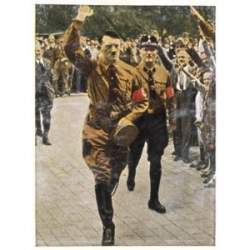
Hitler's decision to call the meeting was something of a gamble. His aim was to restore some resemblance of party unity and agree a future programme. To achieve this he had to put pressure on his rival Gregor Strasser's delegates to come into line. What was meant to be a debate was quickly turned into a five-hour monologue, dominated by Hitler.
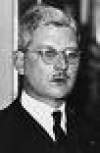
1937 Austria: Austrian leader Schuschnigg threatens to restore the Hapsburg monarchy. [See: Austria: The Other Germany.]
1938 Austria: From Alfred Jodl's Diary:
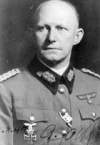
At 2:40 o'clock the agreement of the Fuehrer arrives. Canaris went to Munich to the Counter-Intelligence Office VII and initiates the different measures. The effect is quick and strong. In Austria the impression is created that Germany is undertaking serious military preparations.
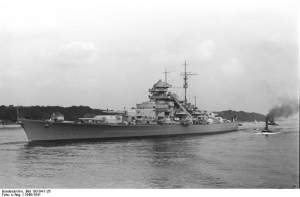
1939 The Bismarck is launched by the German navy: At its time, the German battleship Bismarck was the finest, most feared warship the world had ever seen. It was a super weapon meant to help cut off the British supply lines in the Atlantic.
1940 World War II: War at Sea: Britain announces that all British merchant ships in the North Sea will be armed.
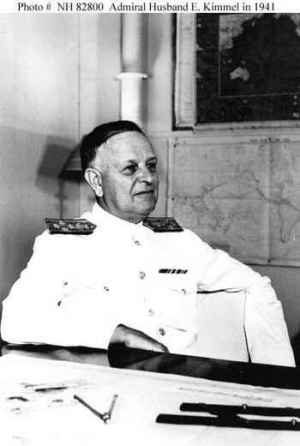
1941 Countdown to Infamy: Rear Admiral Kimmel becomes Commander in Chief of the Pacific Fleet, with the temporary rank of admiral. [See: Countdown to Infamy: Timeline to Pearl Harbor.]
1942 World War II: From a report by Lord Cherwell, a senior scientific adviser to the British government:
In 1938 over 22 million Germans lived in 58 towns of over 100,000 inhabitants. If even half our bombs were dropped on . . . these 58 towns the great majority of these inhabitants (about one third of the German population) would be turned out of house and home. Investigation seems to show that having one's home demolished is most damaging to morale . . . there seems little doubt that this would break the spirit of the people.
Interestingly, Winston Churchill, in 1917, wrote:It is improbable that any terrorization of the civil population which can be achieved by air attack could compel the government of a nation to surrender. Air offensives should consistently be directed at military and communication centres.
1943 World War II: Various:
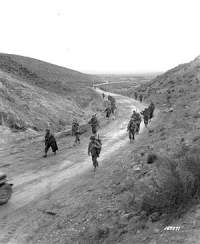
German General Erwin Rommel and his Afrika Korps launch an offensive against an Allied defensive line in Tunisia, North Africa. The Kasserine Pass was the site of the United States' first major battle defeat of the war.
General Erwin Rommel was dispatched to North Africa in February 1942, along with the new Afrika Korps, to prevent his Italian Axis partner from losing its territorial gains in the region to the British. Despite his skill, until this point Rommel had been unable to do much more than manage his own forces' retreats, but the Battle of Kasserine Pass would finally display the "Desert Fox's" strategic genius.
In the Battle of El Alamein in August 1942, British General Bernard Montgomery pushed Rommel out of Egypt and into Tunisia, behind the Mareth Line, a defensive fortification built by Vichy French forces. After taking several months to regroup, Rommel decided on a bold move. Rommel set his [sights on] Tunis, Tunisia's capital and a key strategic goal for both Allied and Axis forces. Rommel determined that the weakest point in the Allied defensive line was at the Kasserine Pass, a 2-mile-wide gap in Tunisia's Dorsal Mountains, which was defended by American troops. His first strike was repulsed. (See February 20 for the continuation)
World War II: Russian Front: Rostov, Voroshilovgrad and Krasny Sulin captured from the Germans.
1945 Various:
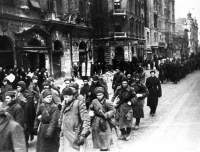
World War II: Soviet forces capture Budapest, Hungary as German forces surrender. The Germans suffer more than 50,000 casualties in the 49-day battle.
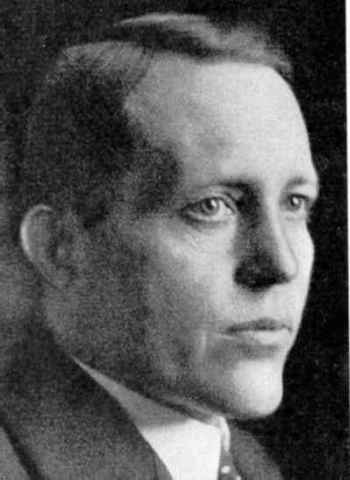
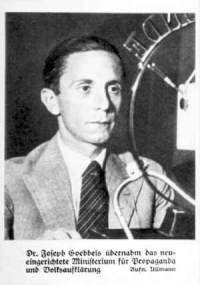
World War II: Goebbels meets with Himmler and conspiratorially suggests that the two of them collude to improve the situation. Concerning peace feelers to the Allies, Goebbels suggests that it is 'more likely that something could be accomplished in the East' with the 'more realistic Stalin. Himmler disagrees, claiming the Britain may still 'come to its senses.' Goebbels suggests that Hitler is overburdened and some of the weight on his shoulders should be shifted to their own. Hitler should be the President-Head of State, Goebbels Reich Chancellor and Foreign Minister, Himmler War Minister, and Bormann as Party Minister. Himmler is noncommittal, telling Goebbels nothing of his own ripening plans to open negotiations with a Swedish Count. (Read)
[See: The Last Days of the Third Reich.]1946 Nuremberg Tribunal: Day Fifty-Nine. Continuation of Col. Pokrovsky's Presentation on Criminal Violation of the Laws and Customs of War in the Treatment of Prisoners of War.
1947 Wunderwaffen: After the US Army refuses to transport Wernher von Braun's fiancee from Germany so that the two can marry, von Braun departs for occupied Germany. Note: Werner von Braun, Hitler's former chief rocket scientist, is now working for the US. (Piszkiewicz) [See: Wunderwaffen: Hitler's Deception and the History of Rocketry.]
1962 Vietnam: Kennedy authorizes U.S. advisors to fire in self-defense:
President John F. Kennedy authorizes U.S. military advisors in Vietnam to return fire if fired upon. At a news conference, he said, "The training missions we have [in South Vietnam] have been instructed that if they are fired upon, they are of course to fire back, but we have not sent combat troops in [the] generally understood sense of the word." In effect, Kennedy was acknowledging that U.S. forces were involved in the fighting, but he wished to downplay any appearance of increased American involvement in the war. The next day former Vice President Nixon expressed hopes that President Kennedy would "step up the build-up and under no circumstances curtail it because of possible criticism." (History.com)
1985 When Austrian Defense Minister and Freedom Party member Friedhelm Frischenschlager meets with Walter Reder, a former SS officer returning from imprisonment in Italy for war crimes, he is defended by Joerg Haider: "He did not receive a criminal but a soldier who did his duty for his fatherland during the war . . . . If you are going to speak about war crimes, you should admit such crimes were committed by all sides and not pick on a few German soldiers."
1985 An International Committee of historians appointed by the Austrian government releases a report concerning Kurt Waldheim's wartime record. While the committee finds that there is no evidence that Waldheim took part in any war crimes, it is determined that he is guilty of lying about his military record. From the committee's final report:
In favor of Waldheim is, that he only had very minor possibilities to act against the injustices happening [in Yugoslavia and Greece]. Actions against these, depending on which level the resistance occurred, were of very different importance. For a young member of the staff, who did not have any military authority on the army group level, the practical possibilities for resistance were very limited and with a high probability would not have led to any actual results. Resistance would have been limited to a formal protest or on the refusal to serve any longer in the army, which would have seemed to be a courageous act, however would have not led to any practical achievement.
In an account of the controversy, Simon Wiesenthal wrote that Waldheim was stationed 5 miles from Salonika while, over the course of several weeks, the Jewish community which formed one third of the population there, was sent to Auschwitz. Waldheim denied any knowledge of this. Wiesenthal states: "I could only reply what the committee of historians likewise made clear in its report: "I cannot believe you."2011 Hungary: War crimes charges filed against 97-year-old man:
In Budapest, a 97-year-old man is charged with allegedly committing war crimes during World War II. According to the charge sheet, Sandor Kepiro was complicit in the execution of four innocent civilians in Novi Sad, Serbia, between 21 and 23 January 1942, as the commander of a patrol.
An estimated 1,200 civilians suspected of aiding local resistance fighters‑‑many of them Jews and Roma‑‑were rounded up and taken to the bank of the Danube to be killed. The victims, some still alive, had their bodies thrown under the ice of the frozen river. The Hungarian forces then shot into the ice to break it up. Most of the victims drowned. Kepiro's patrol was allegedly also responsible for the deportation in a truck of 30 people who were later executed, and for the killing of two brothers who tried to escape, bringing the number of victims to 36.
"The prosecutor's office is not investigating the Novi Sad Massacre in its entirety but only the actions of the suspect," the spokeswoman told AFP, noting that some 200 patrols, each made up of 10 to 12 people, had taken part in the mass killings, with only one under Kepiro's command. "Mr. Kepiro is currently free, but he will have to appear in court during the trial. The importance of this case is such, nationally and internationally, that the court will certainly proceed swiftly with this trial," she added.
Kepiro was convicted in 1944 and 1946 by a Hungarian court, but was never jailed and denied all the allegations against him. In 1996, he returned to Hungary after decades in hiding in Argentina. The case was reopened after a researcher of the Simon Wiesenthal Center discovered his whereabouts in 2006. Kepiro, has denied the charges. "I am innocent and need to be acquitted. I am bedridden and can't leave my home. I have nothing." In 2008, Serbia's war crimes prosecutor called for a formal investigation into Kepiro's actions, estimating that he had "consciously and willingly taken part . . . in the murder of at least 2,000 Jews and Serbs" in Novi Sad.
Edited by Levi Bookin (Copy editor)
levi.bookin@gmail.com



Click to join 3rdReichStudies

FAIR USE NOTICE: This site may contain copyrighted material the use of which has not always been specifically authorized by the copyright owner. We are making such material available in our efforts to advance understanding of historical, political, human rights, economic, democracy, scientific, environmental, and social justice issues, etc. We believe this constitutes a 'fair use' of any such copyrighted material as provided for in section 107 of the US Copyright Law. In accordance with Title 17 U.S.C. Section 107, the material on this site is distributed without profit to those who have expressed a prior interest in receiving the included information for research and educational purposes. If you wish to use copyrighted material from this site for purposes of your own that go beyond 'fair use', you must obtain permission from the copyright owner.
Please note that the list-owner and the moderator are not responsible for, and do not necessarily approve of, the random ads placed on our pages by our web server. They are, unfortunately, the price one pays for a 'free' website.